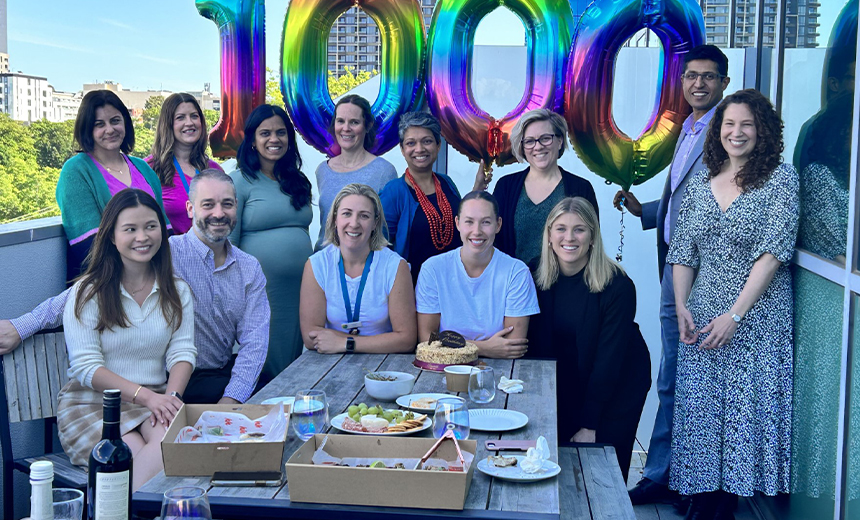Is IVF treatment going ahead?
The current restrictions to non-elective surgery that led to the suspension of some IVF services in Victoria will be lifted from 11.59pm on Tuesday 25 January 2022. This means that IVF stimulation cycles can resume from 26 January 2022. However, as the 26th is a public holiday, in-clinic procedures such as egg collection will effectively resume on 27 January 2022. Please contact your fertility nurse on Day 1 to check in as you usually would.
In the meantime, all other procedures continue as planned, including IVF cycles that commenced prior to 6 January 2022, frozen embryo transfers (FET), intrauterine insemination (IUI), ovulation induction, urgent medical egg freezing (e.g. due to impending cancer treatment), semen analyses and sperm freezing.
Should I have the COVID-19 vaccine (or booster) if I’m undergoing fertility treatment or IVF?
Yes. Based on advice from the Australian & New Zealand Society of Reproductive Endocrinology and Infertility, we support the decision to get a COVID-19 vaccination, including boosters, during fertility treatment. There is no evidence that the vaccine will affect your overall fertility or current treatment, nor the pregnancy that follows. This is true for both men and women.
We recommend that you avoid having the vaccine (or booster) in the days leading up to your admission to the hospital for embryo transfer or egg collection. Approximately 15% of patients have a fever following vaccination. Whilst this in itself is not worrying, hospital protocols may prevent patients who have a fever from being admitted to the hospital.
Should I have the COVID-19 vaccine (or booster) if I am pregnant?
Yes. The Pfizer vaccine is now recommended for all women who are pregnant. There has been extensive use of this vaccine in the US and UK with no specific pregnancy complications and no increase in overall complications compared to non-pregnant recipients. There has been no increase in fetal abnormalities or birth defects, nor is there any plausible reason for how this could occur. What has been seen with vaccine administration is a reduction in the chance of the pregnant woman getting COVID-19, and we know that pregnant women are more likely to get severe COVID infection requiring hospitalisation, admission to an Intensive Care Unit, and death. Increased rates of premature delivery of babies has been seen in pregnant women with severe COVID, and this can be reduced through vaccination.
Does the COVID-19 vaccine (or booster) cause miscarriage?
No. There is no evidence of an increased risk of miscarriage or abnormalities in the physical development of your baby.
Should I have the COVID-19 vaccine (or booster) if I am breastfeeding?
Yes. COVID-19 vaccines are thought to be safe and not considered to be a risk to your child.
How do COVID-19 vaccines work?
These vaccines protect you from COVID-19 by fooling your immune system into making an immune response to small proteins that are associated with the SARS-CoV-2 virus (the virus causing the disease COVID-19). Your body will then have pre-built immunity should you ever be exposed to the real virus and you will be protected. For an adequate response, it is recommended that you receive the vaccine twice, several weeks apart (for Pfizer, which is currently the only vaccine recommended for use during pregnancy or for men and non-pregnant women aged 40–59) and several months apart for AstraZeneca (which men and non-pregnant women aged 18–39 may receive if they provide informed consent). A booster shot is now also recommended. At the time of writing, it is recommended that Victorians have their booster 3 months after their second vaccination. Further booster shots may be recommended in the future.
What are the side effects of the COVID-19 vaccine?
There are minimal side effects that remain uncommon. These include a sore injection site, headache, fatigue, temperature rise and muscle weakness. These symptoms are not from you having ‘mild COVID-19’; they are a result of the immune response that your body mounts in response to the vaccine.
What should I do if I am newly pregnant?
Get the vaccine as soon as possible! As above, the Pfizer vaccine has been determined safe for use during pregnancy in Australia.
What effect does the COVID-19 pandemic have on my fertility treatment?
As of 27 January 2022, we will be back to offering all of our usual fertility treatments. In the meantime, Newlife IVF remains open, and our fertility specialists, nurses and counsellors are all available, with consults taking place virtually (via telehealth or videoconferencing). Patients are still able to attend face-to-face appointments with their fertility specialist when an examination is required. During IVF cycles, patients are able to attend for pathology and ultrasound tracking in person, as well as undergo their fertility procedures in our on-site partner day surgery, Epworth Eastern Ekera.
Please note: Newlife IVF must follow directives from the Department of Health, as well as the policies of Epworth Eastern Hospital, and these are subject to change. Currently, all patients undergo exposure risk screening prior to attending our facilities, and in some circumstances, a COVID-19 swab is required.
Further, any patient actually diagnosed with coronavirus will be managed by the Department of Health, and they will be unable to attend the clinic while infectious.
As we all know, Government and Department of Health advice can change at short notice. However, we are hopeful that there will be no further forced interruptions to IVF or fertility treatment once all treatment resumes on 27 January 2022.
If I am having difficulty conceiving, is it still safe to seek help?
It is safe to undergo fertility assessment and treatment due to the numerous precautions we’re taking during the process. We still advise you to seek help from one of our specialists in line with our usual recommendations:
- If you are under 35, we advise seeking help after 12 months of trying for a baby without success.
- If you are over 35, we recommend seeking help after just 6 months of trying.
We can arrange a virtual consult or see you in our rooms with suitable precautions in place. Our clinic is taking a number of steps to ensure safety, such as maintaining social distancing by staggering patient appointments and temperature checks. Please ensure good hand hygiene and frequent hand washing or use of hand sanitiser if attending in person.
We recommend patients remain proactive about their fertility assessment and treatment throughout this period due to the natural decline in fertility with age.
What should I do during this period if I’m undergoing fertility treatment?
We are encouraging our patients to do all the recommended actions to reduce their risk of being exposed to COVID-19 including social distancing and hand hygiene, and we are strongly supporting vaccination against COVID-19 before and during fertility treatment. It’s even more important than usual to keep healthy by eating well and exercising to benefit your physical and mental health – see our blog for useful tips.
What happens if I am quarantined during or before my fertility treatment?
During your period of quarantine, we will be following advice from the Department of Health and Human Services, who may advise that you are unable to attend Newlife IVF clinics for appointments, ultrasounds, blood tests or fertility procedures (such as embryo transfer). If you suspect you need to self-quarantine or have been told to undergo quarantine, please contact our nursing team as soon as practicable by calling (03) 8080 8933. While our first priority is to reduce the spread of coronavirus through our community, we will do what we can to facilitate your care and continue with your treatment, if it’s appropriate and safe to do so. For example, some appointments can be managed by teleconference, or home delivery of medications may be appropriate. Your fertility nurse will advise what is possible in your particular situation.
What effect does COVID-19 have on pregnant women?
Over the course of the pandemic, lots of information has been gathered on the impact of COVID-19 on pregnancy. We can now say with confidence that:
- There is no direct effect on a baby’s physical development if his/her mother is infected with COVID-19. By this, we mean, the virus itself does not lead to an increase in fetal abnormalities.
- There are some reports of COVID-19 causing an infection in an unborn baby, but the risk must be quite low.
- There is an increase in premature birth if the mother is infected with COVID-19.
- Pregnant women are not more likely to become infected with COVID-19 than non-pregnant women.
- Pregnant women are more likely to have severe COVID-19 infections. Severe infection includes a much higher rate of hospital admission, respiratory distress syndrome, and intensive care unit admission for mechanical ventilation (breathing with a tube). This is the major contributor to the increase in preterm birth; pregnant women can be so unwell that the baby must be delivered, regardless of the gestation, in order to save the mother’s life.
- Pregnant women are more likely to die from COVID-19 infection than non-pregnant women.
However, it is important to note that most pregnant women who have a COVID-19 infection experience a mild infection only and recover fully with no impact on the pregnancy.
Can I pass coronavirus on to my baby?
It is possible but very unlikely.
If I am diagnosed with coronavirus during my pregnancy, what effect will it have on my baby?
The major risk to your baby is that premature birth is more likely. It does not increase the chance of abnormalities in your baby.
I’m still worried – what can I do?
It is understandable to feel anxious at this time on top of the normal worries associated with fertility treatment and pregnancy. Don’t feel like you have to cope alone. We are always here to help, and the coronavirus pandemic is no exception. Please do not hesitate to call (03) 8080 8933 to speak to one of our team members or email [email protected]. We will then direct you to our fertility specialists, nursing or counselling team, as appropriate, for support and information.
This is certainly an extraordinary time but we will all get through it together.
If you have any further questions, do get in touch!
Stay safe and take care, from Chris and the rest of the Newlife IVF team.
#inthistogether
Disclaimer: all information in this post is correct as of 20 January 2022 and will be regularly updated as new information and advice from health authorities comes to hand.


